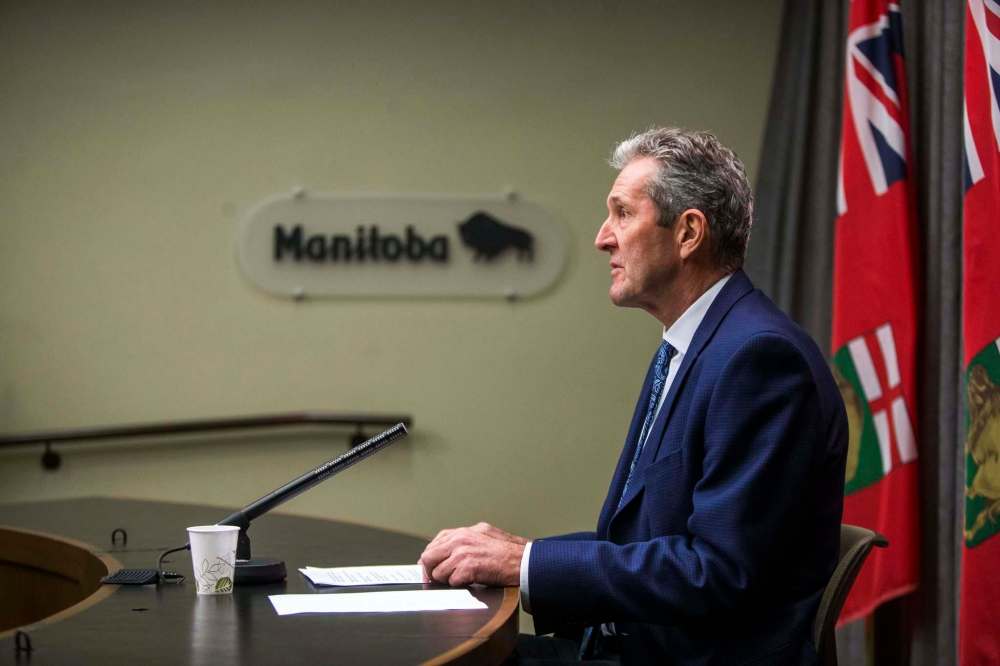Spectre of civil servant layoffs could haunt Manitoba in long term
Read this article for free:
or
Already have an account? Log in here »
To continue reading, please subscribe:
Monthly Digital Subscription
$0 for the first 4 weeks*
- Enjoy unlimited reading on winnipegfreepress.com
- Read the E-Edition, our digital replica newspaper
- Access News Break, our award-winning app
- Play interactive puzzles
*No charge for 4 weeks then price increases to the regular rate of $19.00 plus GST every four weeks. Offer available to new and qualified returning subscribers only. Cancel any time.
Monthly Digital Subscription
$4.75/week*
- Enjoy unlimited reading on winnipegfreepress.com
- Read the E-Edition, our digital replica newspaper
- Access News Break, our award-winning app
- Play interactive puzzles
*Billed as $19 plus GST every four weeks. Cancel any time.
To continue reading, please subscribe:
Add Free Press access to your Brandon Sun subscription for only an additional
$1 for the first 4 weeks*
*Your next subscription payment will increase by $1.00 and you will be charged $16.99 plus GST for four weeks. After four weeks, your payment will increase to $23.99 plus GST every four weeks.
Read unlimited articles for free today:
or
Already have an account? Log in here »
Hey there, time traveller!
This article was published 14/04/2020 (2065 days ago), so information in it may no longer be current.
The question everyone should be asking Premier Brian Pallister: why?
Why would he raise the prospect of laying off Manitoba civil servants at such a delicate stage of the economic lockdown prompted by the global COVID-19 pandemic?
The plan as outlined Tuesday is still vague. Pallister said he would negotiate with union leaders soon on what amounts to a variation on the federal Employment Insurance job-sharing program: two to three days of paid work and the remainder of the work week to be covered by EI. It amounts to an overall 25 per cent salary cut.
Historically, those who work in the public sector have not been allowed to access to job sharing.
A Manitoba official, who spoke on background, said Ottawa has already agreed to extend the program to all non-core public servants, covering Crown corporations, government business enterprises, school divisions (excluding teachers), and post-secondary institutions (excluding professors and instructors).
However, those who work directly for government — so-called core employees — are still excluded.
Pallister met with union leaders Tuesday to ask for help in lobbying Ottawa to further expand job sharing to include core civil servants. Lurking in the background was a clear threat of layoffs if the unions don’t help out.
Whether the premier would resort to actual layoffs is hard to determine. Some employees of Crown corporations, including casino workers, have already been laid off. Would he cut deeper into the ranks of the civil service?
Such a strategy is rife with risk, both in terms of the premier’s personal brand but also the economy in general.
There is no good option facing the Pallister government right now.
On the one hand, tens of thousands of Manitobans are facing economic ruination, with many unsure they will be able to afford even the most basic necessities (food, shelter). At the same time, government revenues are eroding at a record pace.
A background document, released Tuesday, estimated the province’s monthly deficit could rise to more than $400 million. You read that correctly: monthly. At that pace, Manitoba could run a deficit in excess of $5 billion.
As is the case with most of the numbers cited by the Pallister government, those deficit numbers are pumped full of hyperbole– a worst-case scenario that would require the economic lockdown to continue for the remainder of the current fiscal year.
As is the case with most of the numbers cited by the Pallister government, those deficit numbers are pumped full of hyperbole — a worst-case scenario that would require the economic lockdown to continue for the remainder of the current fiscal year.
Even with the premier’s tendency to exaggerate, it is true just as government is being asked to do more, it has less fiscal capacity. For a politician like Pallister, who values balanced budgets and tax cuts more than almost any other political goal, this has to be a painful experience.
Meanwhile, the Tory leader needs to tread carefully when it comes to something as potentially damaging as layoffs. The opportunity to transfer a huge portion of provincial labour costs to the federal government may be too tempting to resist, but it comes with peril.
The pandemic is a short-term challenge to government fiscal capacity, more akin to a natural disaster than a normal recession or depression that can hobble an economy for years. Although no one knows how long the lockdown is going to last, one can say with some degree of certainty it will end before the end of the 2020-21 fiscal year. With that will come a restoration of government revenues.
Government layoffs could make the bad situation even worse. Layoffs, furloughs or the job-sharing Pallister is pursuing will only swell the ranks of Manitobans unable to continue spending; less spending means less government tax revenue. Many of the benefits of a reduced payroll could be erased by a steeper decline in revenues.

For a province so dependant on federal transfer payments to make ends meet, passing on additional costs to Ottawa may turn out to be strategy that trades long-term trouble for some short-term relief.
Pallister has repeatedly and steadfastly refused to connect the dots between his fiscal policies and the fate of the economy he oversees. Governments are huge employers and purchasers of goods and services. When governments tighten the belt, the entire economy feels the pinch.
Pallister’s refusal to acknowledge that simple equation is largely behind his lacklustre response to the economic impacts of the pandemic. Manitoba is easily the least generous province in Canada when it comes to topping up federal income support benefits.
On Monday, the premier cemented his role as the resident Scrooge of the Council of the Federation when he held a news conference to announce his government was providing resources to help Manitobans apply for federal benefits. Seriously — an entire news conference to announce what amounts to a plan to buy pencils to fill out applications.
Underwhelming is the least offensive way of portraying the moment.
During every news conference, the premier likes to talk at length about how he believes Manitobans are the most generous, most compassionate people in Canada. It’s time for him to start showing the same principles in the way he governs.
dan.lett@freepress.mb.ca

Born and raised in and around Toronto, Dan Lett came to Winnipeg in 1986, less than a year out of journalism school with a lifelong dream to be a newspaper reporter.
Our newsroom depends on a growing audience of readers to power our journalism. If you are not a paid reader, please consider becoming a subscriber.
Our newsroom depends on its audience of readers to power our journalism. Thank you for your support.






